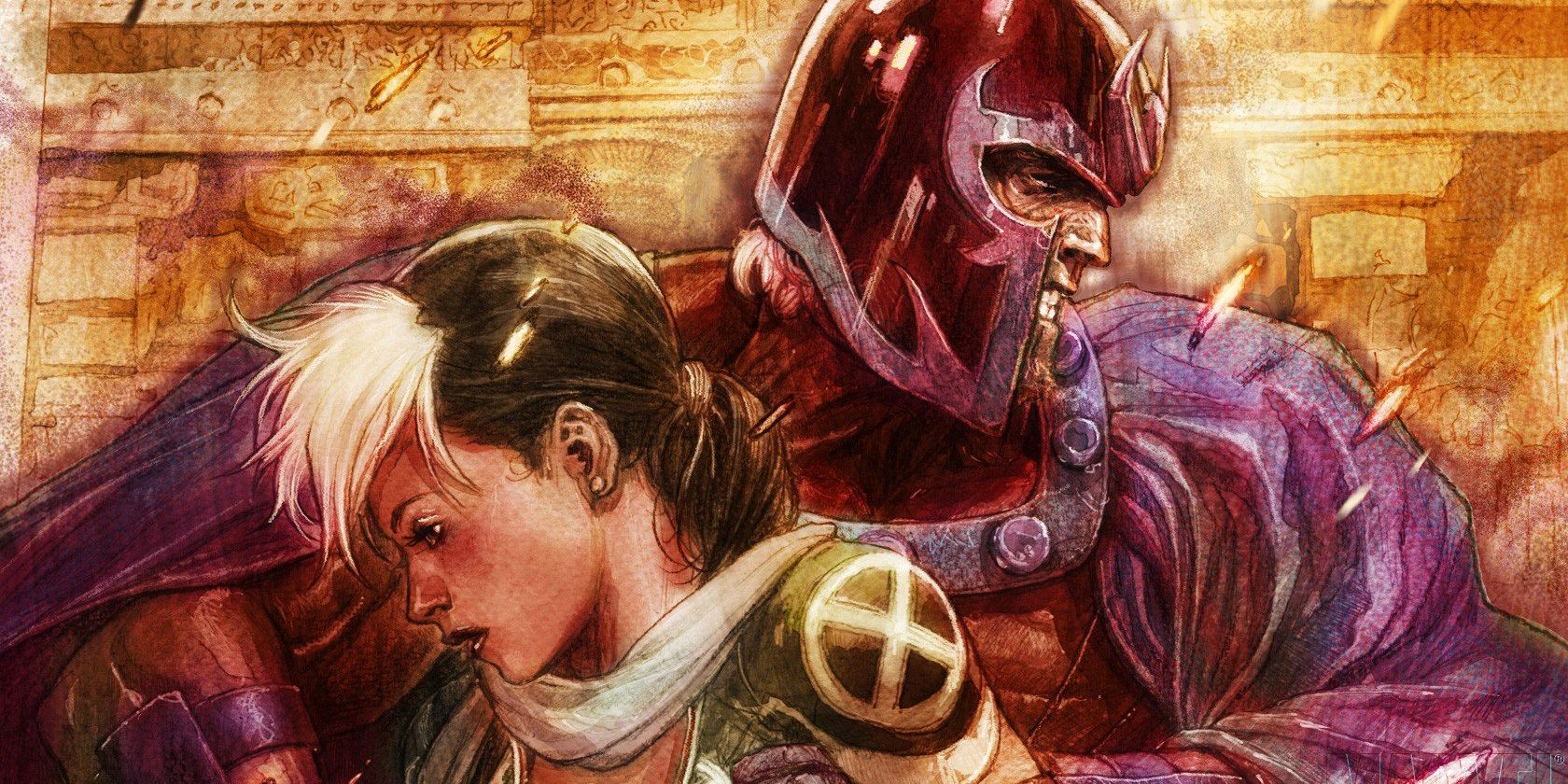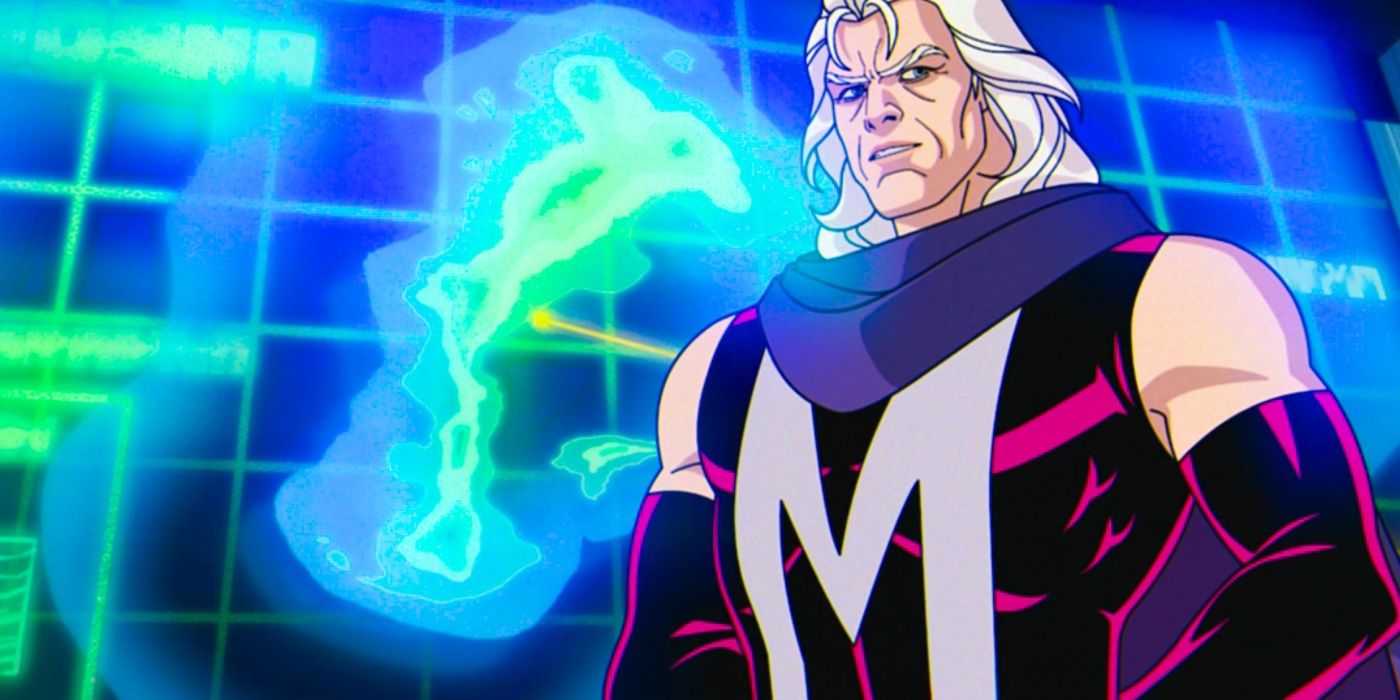X-Men ’97 is recalling a controversial relationship between Rogue and Magneto, who seems strangely immune to her absorption mutant power.

X-Men ’97 has arrived with several thrilling developments, including Magneto’s apparent immunity to Rogue’s absorption powers. Produced by Marvel Studios, X-Men ’97 revives the classic 1990s X-Men: The Animated Series, recommencing the narrative months after the show’s dramatic conclusion. As such, X-Men ’97 is building upon established characters and narratives to continue adapting classic X-Men stories. A surprising scene from X-Men ’97 season 1, episode 2, “Mutant Liberation Begins,” depicted Magneto touching Rogue without feeling the effects of her powers, teasing some potentially huge stories for Marvel’s X-Men ’97.
As seen in Marvel Comics and Fox’s X-Men movies, Rogue’s mutant ability allows her to temporarily absorb the powers, skills, and memories of others by touching their bare skin – leaving people without their powers and in a weakened state. Typically, this is an uncontrollable power that greatly affects Rogue’s life, rendering her unable to feel another person’s touch. This has been depicted throughout X-Men: TAS, with the emotional consequences explored in season 2, episode 9, “A Rogue’s Tale.” X-Men ’97 is seemingly building upon this through the scene with Magneto, with potentially drastic consequences for the show’s future.
Why Magneto Is Immune To Rogue’s Powers
There Have Been Several Explanations In Marvel Comics

In X-Men ’97, Rogue and Magneto touch each other tenderly, prompting two major developments in their characterizations for the animated series. Firstly, it established Magneto’s immunity to Rogue’s absorption powers. There have been several explanations for this over the years. The most recent reason is that Magneto is able to produce a magnetic shield that protects him from Rogue’s powers. However, numerous other reasons have been proffered by Marvel Comics. In the 1995 crossover event Age of Apocalypse, Rogue permanently absorbs Polaris’s magnetic powers – much like she permanently absorbed Ms. Marvel’s powers in the primary timeline.
As a result, Rogue and Magneto’s powers cancel each other out, meaning that Magento becomes immune to Rogue’s absorption abilities. Other stories have depicted Rogue touching, and even kissing Magneto, and only being able to absorb a limited amount of his life force and abilities, rather than the usual, lethal level of Rogue’s powers. Through these various means, it has become a common feature in X-Men comics for Magneto to be immune to Rogue’s powers, either through their natural mutations protecting each other or as an extension of Magneto’s mighty powers.
Magneto & Rogue’s Comics History Explained
Magneto And Rogue Have A Complicated History

Magneto and Rogue clashed frequently throughout various X-Men storylines following Rogue’s official induction into the team in 1983’s Uncanny X-Men #171. Following this, X-Men adventures in the battle to protect mutants and humanity bring Rogue into conflict with Magneto. However, a major change occurred in 1991’s Uncanny X-Men #274, when Rogue loses her powers and joins Magneto in his mission to turn the Savage Land into a mutant utopia. Without her powers, Rogue can touch Magneto, leading to the pair developing a brief relationship, which ends after Magneto kills Zaladane and Rogue reconsiders her affection for the villain.
Magneto and Rogue have had several infamous romance plots throughout Marvel Comics. The next occurred in the Age of Apocalypse event. During this crossover event, Rogue and Magneto develop a relationship after learning that their magnetic powers cancel each other out and even have a child together. Subsequent storylines have depicted Rogue and Magneto’s romance, including another alternative timeline narrative, “Age of X,” and its immediate fallout. With the obvious affection between the two in X-Men ’97, the animated series is introducing their romance into canon, with it presumably occurring before the original series began in 1992.
What X-Men ’97 Is Setting Up For Rogue And Magneto
X-Men ’97 Is Setting Up Several Potential Narratives

Rogue’s reference to her dark past in X-Men ’97 could indicate that she absorbed Polaris’s powers in the previous timeline, which could be revisited in the series. It’s unlikely that this would be told as part of an Age of Apocalypse adaptation, however, as the event was fairly covered in X-Men: TAS season 4, episodes 1-2 “One Man’s Worth” – the episode that actually inspired the comic book crossover event. Magneto’s immunity could also tease the pair’s Savage Land storyline, though this was covered fairly extensively throughout X-Men: The Animated Series season 2.
It’s more likely that X-Men ’97 is setting up the “Utopia” storyline, in which Rogue and Magneto are romantically entangled, and the X-Men establish a mutant haven known as Utopia – much like Magneto’s abandoned Genosha. Genosha was referenced in X-Men ’97 season 1, episode 2, “Mutant Liberation Begins,” during which Magneto refers to the nation as a safe space for mutants to live. This narrative was initiated in the final season of X-Men: TAS and culminated in the episode “Sanctuary,” when Magneto establishes his famed island nation by rebuilding parts of his base, Asteroid M, on Earth.
This is precisely how Utopia was built in Marvel Comics, suggesting the two islands will be combined into a single haven in X-Men ’97. During the original show’s finale, “Graduation Day,” Magneto was primed to lead his Genoshan army into battle against the humans but abandoned his plans to visit the dying Charles Xavier on his deathbed. This could be recommenced when/if Magneto becomes disillusioned with continuing Xavier’s dream of mutant-human integration while also exploring the repercussions of Rogue’s relationship with Gambit in X-Men ’97.
